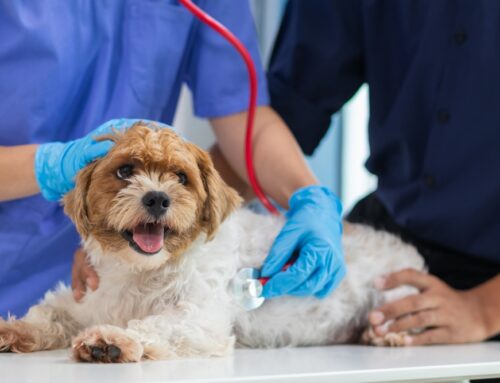Congratulations on welcoming a new puppy into your home! The first year of your puppy’s life will include discovery and adjustments for you and your new family member. Puppies are filled with endless energy, curiosity, and cuteness that makes them an irresistible addition to the family. Ensure your new puppy starts out on the right paw by following these guidelines from Oliver Animal Hospital, your southwest Austin veterinary team.
Veterinary visits and vaccinations
Your puppy will need several veterinary visits during the first six months of their life, to ensure they build a strong immune system and develop appropriately. Their first veterinary visit should be scheduled shortly after they have moved into your home. Starting at 6 weeks of age, your puppy will receive three rounds of booster vaccinations every three to four weeks. Don’t miss their scheduled booster vaccination appointments, as your puppy’s ability to fight off various diseases depends on the schedule your veterinarian sets. Once your puppy receives their final vaccination series, a plan for socialization outside the home can begin.
Parasite control from puppy-hood to adulthood
Puppies commonly come to their new family with intestinal parasite infections that were contracted from their mother or original environment. During your puppy’s first 12 weeks of life, they will receive several deworming treatments, as well as a fecal test to ensure the parasites have been cleared from their gastrointestinal system. Additionally, your veterinarian will advise lifelong monthly parasite control. Because medication doses are based on your puppy’s weight, each month they will receive a varying dose of parasite prevention until they become an adult and their weight stabilizes. Always ensure your puppy’s environment is as clean as possible, and remove fecal material to prevent infection or reinfection of certain parasites.
Feeding your puppy
Choosing the right diet for your puppy can be overwhelming and confusing. Fortunately for you, Oliver Animal Hospital pharmacy offers a variety of nutritionally complete foods for every stage of your dog’s life. Depending on their breed and appetite, most puppies will eat three or four times daily during the first 12 weeks of their life. Remember that at around 12 to 16 weeks of age, puppies will begin teething and may have some difficulty with harder kibble. If you notice this, try adding warm water to soften their food, or give the canned equivalent of the brand you are currently feeding. From ages 3 to 6 months, feeding frequency can be reduced to three times daily, and then to twice daily at 6 months of age and thereafter. Puppies can begin transitioning to adult dog food at around 9 to 12 months of age. Always consult with your veterinarian before changing your pet’s diet.
House and crate training your puppy
As your puppy’s bladder develops, their ability to avoid accidents in the house will quickly improve, especially after a positive house-training experience. During their first week home, it’s important to take your new puppy out for bathroom breaks every hour when they are awake. Also, take them out as soon as they wake in the morning, wake from a nap, after playing or extended bouts of exercise, and after eating and drinking. After their first week or two in your home, try extending time between bathroom breaks to every two to three hours. A regular and consistent schedule is key to ensuring a successful puppy house-training program. Additionally, take them to the same spot outside, and use a specific word or phrase to tell them what they should do. After every successful outside elimination, immediately praise or treat your puppy, so they understand the desired behavior.
Crate training can also help with successful house training. A crate serves as a safe, comforting environment for your puppy when you cannot observe their activities. Your pet can take up to six months to be crate trained, so you must be patient and calm.
Puppy socialization

Proper puppy socialization is key to avoiding a lifetime of stress and behavior problems. If you have other household pets and people, start with brief supervised meetings and interactions. Treat or praise your puppy during each meeting to reinforce their positive behaviors. Extend their socialization session times until you are confident and comfortable that unsupervised interactions will be uneventful.
Once your puppy has received all their vaccinations, socialization outside the home can begin. Take your puppy—always leashed—to public areas with high foot traffic, such as a park, to acclimate them to different people, animals, and sounds. Always be ready with praise and treats, to reinforce your puppy after they experience a new smell and interaction.
Scheduling your puppy for a spay or neuter
The final milestone for your puppy’s care is scheduling them for a spay or neuter procedure. In addition to population control, this procedure has several health benefits, including decreased cancer risks, decreased desire to roam, and improved behavior. Depending on their breed and behavior, most dogs are spayed or neutered between 6 to 12 months of age. Always talk to your veterinarian about the best plan for this surgical procedure.
Our Oliver Animal Hospital team is excited to help you welcome a new puppy into your family. Don’t hesitate to call our office with any questions or concerns about your puppy, or to schedule an appointment.







Leave A Comment